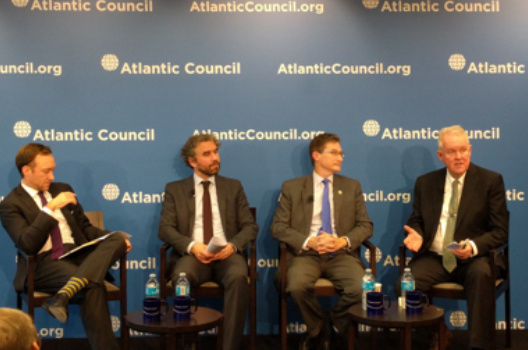 On October 31, 2017, the Atlantic Council’s Global Energy Center, along with the Council’s Future Europe Initiative and the Embassy of the Federal Republic of Germany, convened an expert panel for a conversation about the current state of climate action in the United States and in the transatlantic relationship more broadly. Ambassador Richard Morningstar (Ret.), the Global Energy Center’s founding director and chairman, introduced the event by noting the important and timely nature of the conversation, given the upcoming twenty-third session of the Conference of the Parties (COP 23) in Bonn, the Trump administration’s announcement that the United States plans to withdraw from the Paris Agreement, and the emergence of pledges from state and local governments and businesses to remain committed to trying to reach the agreement’s goals.
On October 31, 2017, the Atlantic Council’s Global Energy Center, along with the Council’s Future Europe Initiative and the Embassy of the Federal Republic of Germany, convened an expert panel for a conversation about the current state of climate action in the United States and in the transatlantic relationship more broadly. Ambassador Richard Morningstar (Ret.), the Global Energy Center’s founding director and chairman, introduced the event by noting the important and timely nature of the conversation, given the upcoming twenty-third session of the Conference of the Parties (COP 23) in Bonn, the Trump administration’s announcement that the United States plans to withdraw from the Paris Agreement, and the emergence of pledges from state and local governments and businesses to remain committed to trying to reach the agreement’s goals.
Moderated by Randolph Bell, the Global Energy Center’s managing director, the panel included Ben Grumbles, the secretary of the environment at the Maryland Department of the Environment; Dennis Tänzler, the director of international climate policy at Adelphi; and Tommy Wells, the director of the Department of Energy and Environment for the City of Washington, DC. They had a wide-ranging and informative discussion about global climate action, with a focus on state and local action and bottom-up solutions. Based on their experiences on the forefront of local climate action in Maryland and Washington, DC, Ben Grumbles and Tommy Wells expounded on the successes and pitfalls, as well as the priorities, of local action. Dennis Tänzler discussed climate action realities in Europe and the effect the Trump administration’s announcement of intent to withdraw from the Paris Agreement had on the transatlantic relationship. All three panelists agreed that it is necessary to tackle climate concerns from both the private sector and all levels of government and that the transatlantic relationship is critical for encouraging and fostering climate leadership on both sides of the Atlantic.
Image: Randolph Bell, Dennis Tänzler, Ben Grumbles, and Tommy Wells discuss the future of global climate action.
